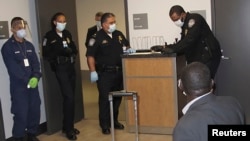U.S. federal health authorities are ordering travelers from three West African countries to monitor their health for 21 days and report daily for any signs of Ebola.
The visitors would be from Guinea, Liberia and Sierra Leone -- the epicenter of the Ebola outbreak.
The monitoring program will start Monday in six eastern states where the majority of those travelers would visit -- Georgia, Maryland, New Jersey, New York, Pennsylvania and Virginia.
The travelers will be given an Ebola kit when they arrive at airports, including a thermometer.
Officials say 21 days represent the maximum incubation period for Ebola.
On Wednesday, President Barack Obama held his first official meeting with his new "Ebola czar," Ron Klain. His job is to coordinate anti-Ebola efforts of multiple U.S. government agencies and aid groups.
After the talks, Obama said the Centers for Disease Control are working to make sure every American hospital has a plan to handle any Ebola case, so that the mistakes made in Dallas are not repeated.
Two nurses who treated a Liberian patient, Thomas Eric Duncan, at the Dallas hospital contracted the disease when precise procedures to protect them apparently were not followed. One nurse is hospitalized outside Washington. The other is in Atlanta.
Cuba health workers
While in Liberia, a fresh contingent of Cuban doctors and nurses arrived Wednesday to help to fight the worst outbreak of the deadly Ebola virus on record alongside a U.S. military mission deploying in the West Africa country.
The 83 doctors and nurses are the latest group of Cuban medical professionals sent to West Africa through an agreement with the World Health Organization.
The first group of 165 doctors and nurses deployed to Sierra Leone at the start of October and another group of around 40 medical staff was due to arrive in neighboring Guinea on Wednesday.
Meanwhile, the head of the International Federation of Red Cross and Red Crescent Societies said the Ebola outbreak that has killed more than 4,500 people in West Africa could be contained within four to six months if the right steps are followed.
Elhadj As Sy told reporters Wednesday in China that the time frame was possible with good isolation and treatment for those with confirmed cases of Ebola, along with proper burials for those who died from the virus.
His comments come as the World Health Organization convenes a meeting of its Emergency Committee on Ebola to discuss the latest developments in the outbreak and whether to alter its recommendations.
The talks are expected to take one or two days, after which the WHO will give a briefing with the results.
Ebola vaccine
U.S. drug company Johnson & Johnson said Wednesday it was working with Danish health company Bavarian Nordic to develop an Ebola vaccine that was projected to begin safety testing in January. Johnson & Johnson said the vaccine would be delivered in two doses, two months apart.
The company said it was spending up to $200 million to accelerate and expand its Ebola research. It said it hoped to have vaccine doses ready for broad clinical trials by mid-2015.
On Tuesday, the WHO said that an experimental Ebola vaccine could be in use by January.
WHO assistant director Dr. Marie-Paule Kieny said clinical trials of Ebola vaccines are underway or planned in Europe, the United States and Africa.
Kieny said if the vaccines are deemed safe, there could be a West African trial in January, using tens of thousands of doses.
She did not say when an Ebola vaccine might be widely available.
Cameraman released
Nebraska Medical Center officials said American video journalist Ashoka Mukpo had recovered from Ebola and was released around 9 a.m. Wednesday from the hospital's biocontainment unit.
In a statement read at a news conference later, Mukpo said, in part: “Today is a joyful day.”
The hospital said Tuesday that Mukpo's blood tested negative for the virus. He had arrived at the Nebraska Medical Center on Oct. 6 and was the second Ebola patient to be treated there. The first, Dr. Rick Sacra, has also recovered.
Liberia, Guinea, and Sierra Leone have been the hardest hit by the Ebola outbreak, with more than 9,100 cases.
U.S. Homeland Security officials are requiring all U.S.-bound travelers from those three countries to arrive through one of five U.S. airports with enhanced Ebola screening.
The airports are in Atlanta, Chicago, New York, Washington and Newark, New Jersey.
Ninety-four percent of travelers coming to the U.S. from those three countries arrive at these airports even during normal conditions.
Some information for this report was provided by AP, AFP and Reuters.





